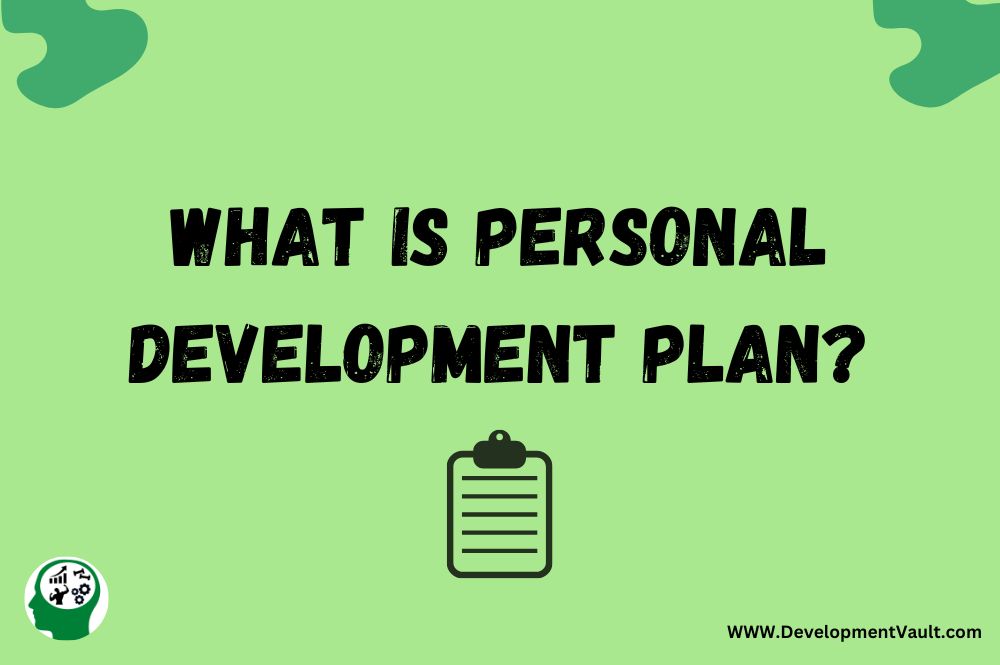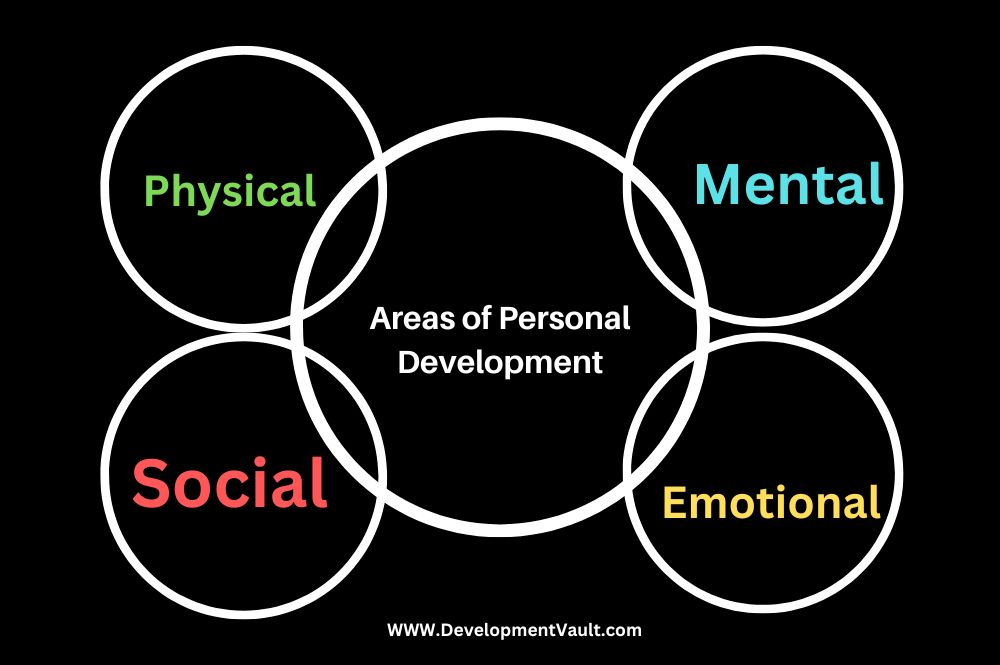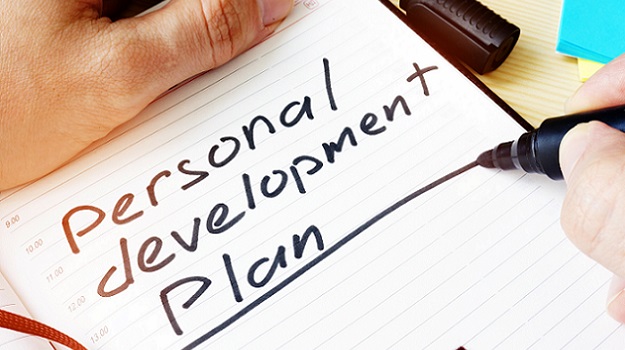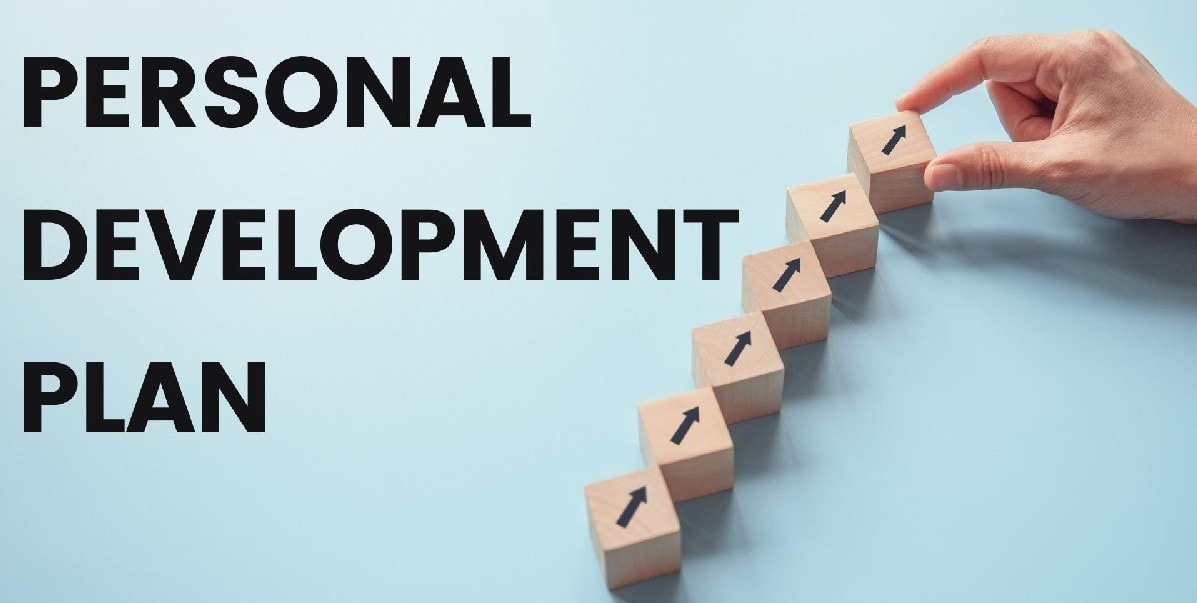Contents
- 1 What is Personal Development Plan?
- 2 Areas of Personal Development
- 3 Which Books Should I Read for Personal Development?
- 4 Why Is It Important To Have a Personal Development Plan?
- 5 Steps To Create a Personal Development Plan
- 6 How Can We Develop Ourselves By Achieving Goals?
- 7 Conclusion
- 8 FAQ (Frequently Asked Question)
- 8.1 How Do I Write a Personal Development Plan?
- 8.2 How Do I Start Personal Development?
- 8.3 What Can I Put On My Personal Development Plan?
- 8.4 What Are Some Benefits Of Personal Development Planning?
- 8.5 Once you write a personal development plan, should you stick to it and not change it until you have reached your long-term goals?
What is Personal Development Plan?

A personal development plan refers to a structured strategy aimed at enhancing one’s individual skills and abilities, ultimately benefiting their future endeavors. It encompasses a wide range of essential skills that are considered valuable for personal growth. However, in cases where these skills are lacking, it becomes necessary to allocate time and effort toward their development.
Fellow individuals, when life unfolds according to a well-devised plan, the likelihood of accomplishing objectives successfully increases substantially. Similarly, when one formulates and diligently adheres to a personal development plan, remarkable self-improvement can be achieved throughout life.
Admittedly, initially crafting an effective personal development plan may pose challenges, particularly if it is an unfamiliar undertaking. Yet, through consistent practice, one can transform into an adept planner. After all, as the age-old saying goes, “Practice makes perfect.”
Hence, without further ado, let us explore several domains of personal development. By delving into these areas, you will gain invaluable insights into the realm of self-growth and personal enhancement.
Areas of Personal Development

Dear friends, now are the opportune moment to delve into the various facets of personal development. It is plausible that a few among you may still be grappling with the concept and scope of personal development. Hence, allow us to shed light on this matter and commence our exploration.
Dear friends, envision personal development as a conglomerate of distinct categories aimed at fostering self-improvement. Within our esteemed Development Vault website, you will encounter a multitude of categories specifically designed to facilitate your holistic growth, including the realms of physical development and mental development, both of which constitute integral categories within the broader scope of self-enhancement.
Likewise, dear friends, there exist several delineated areas within the spectrum of personal development. Now, we shall unveil four such areas that hold immense potential for personal growth and empower you to craft a comprehensive personal development plan, tailored to your unique aspirations and ambitions.
1. Physical

Dear friends, within the realm of personal development, it is imperative to acknowledge the pivotal significance of physical development. Every individual ought to prioritize their physical well-being and embrace measures that contribute to their overall physical growth.
Physical development essentially entails nurturing a state of complete health by adopting a wholesome approach. This entails providing your body with nourishing sustenance, ensuring adequate rest, and incorporating ample protein into your diet. By adhering to these practices, you can foster the physical development of your body.
Oftentimes, individuals yearn to enhance their physical prowess. However, they may find themselves at a loss when it comes to identifying the most effective methods for physical development. Consequently, such individuals may impulsively resort to ill-advised decisions, which can burden them in the long run.
Hence, dear friends, it is crucial to equip yourself with relevant knowledge regarding physical development. This will enable you to make informed decisions and embark on a journey towards physical self-improvement. Remember, physical development assumes a paramount role within the realm of personal development.
Simple Ways for Physical Development
Dear friends, if you aspire to embark on a journey of physical development, there are several simple yet effective methods that can aid you in achieving your goals. Here are a few practical ways to enhance your physical well-being:
- Engage in Regular Exercise: Incorporate a consistent exercise routine into your daily life. This can include activities such as jogging, cycling, strength training, or participating in sports. Regular exercise promotes muscle strength, cardiovascular health, and overall physical vitality.
- Maintain a Balanced Diet: Consume a nutritious and well-balanced diet that encompasses a variety of fruits, vegetables, whole grains, lean proteins, and healthy fats. Providing your body with the necessary nutrients supports optimal physical development.
- Prioritize Rest and Recovery: Allow your body ample time to rest and recover from physical exertion. This entails getting an adequate amount of sleep each night and incorporating rest days into your exercise routine. Rest is essential for muscle repair and overall rejuvenation.
- Stay Hydrated: Drink an ample amount of water throughout the day to keep your body adequately hydrated. Water aids in digestion, circulation, and the maintenance of overall bodily functions.
- Seek Professional Guidance: Consider consulting with a fitness professional, such as a personal trainer or a nutritionist. They can provide personalized guidance and tailor an exercise and nutrition plan to suit your specific needs and goals.
- Monitor Progress and Set Goals: Keep track of your physical development by measuring key indicators such as body weight, body measurements, or fitness milestones. Set realistic goals and work towards them gradually, celebrating your achievements along the way.
- Maintain Consistency and Discipline: Physical development requires commitment and discipline. Stay consistent with your exercise routine and dietary habits, even during challenging times. Consistency is key to achieving long-term results.
- Zumba Dance: if you are seeking an exhilarating and captivating approach to embark on your physical development journey, consider the lively and invigorating world of Zumba dance. This vibrant form of exercise encompasses a fusion of energetic dance movements and aerobic elements, making it an enjoyable and effective way to enhance your physical well-being.
Dear friends, by embracing these simple yet impactful strategies, you can pave the way for your physical development journey. Remember, small steps taken consistently can lead to significant improvements in your overall physical well-being.
2. Social

In the realm of social and personal development, lies a transformative journey—one where you immerse yourself in the art of socializing, forging new connections, and reaping the countless benefits that follow. Social personal development revolves around expanding your social network and cultivating friendships with diverse individuals.
As you embark on this remarkable path, a multitude of advantages awaits. Let us illuminate the profound benefits that accompany the pursuit of social personal development:
- Business Growth: By connecting with a multitude of individuals, a natural exchange of knowledge and opportunities unfolds. As they become acquainted with your business, you, in turn, gain insights into their ventures. This mutually beneficial exchange fosters business growth expands your client base, and nurtures professional development.
- Enhanced Communication Skills: Regular social interactions serve as a powerful catalyst for the refinement of your communication abilities. Engaging with diverse perspectives and navigating conversations sharpen your communication skills, empowering you to articulate your thoughts, ideas, and aspirations effectively. This invaluable skillset will prove immensely beneficial in all facets of your future endeavors.
- Mitigating Loneliness: Social personal development plays a pivotal role in combating loneliness. By cultivating a robust network of friends and fostering meaningful connections, you create a supportive community that stands beside you during moments of solitude. This nurturing network fills your life with companionship, fostering a sense of belonging and dispelling feelings of loneliness.
Dear friends, social personal development is not merely an option; it is an essential aspect of every individual’s journey. Embrace the power of connection, open your heart to new encounters, and witness the profound transformation that awaits you.
By nurturing friendships and expanding your social horizons, you embark on a path of personal growth, enriched relationships, and an ever-present sense of fulfillment.
Social Leadership
Dear friends, in today’s digital age, it is common for individuals to confine their networking endeavors solely to social media platforms. However, we want to emphasize the immense value of expanding your network beyond the virtual realm and engaging in real-world social networking.
To embark on the path of social leadership, it is vital to venture beyond the boundaries of social media and actively participate in social networking in the tangible world. Let us explore the essence of social leadership and the steps you can take to embrace it:
- Forge Genuine Connections: Take the initiative to meet new people and cultivate authentic friendships beyond the digital sphere. By engaging in face-to-face interactions, you can build meaningful connections grounded in shared experiences and personal encounters.
- Embrace the Art of Social Leadership: Social leadership revolves around impressing others with your skills, talents, and qualities, earning their respect and recognition. It is about becoming a leader among your peers, inspiring and influencing them through your actions and abilities.
- The Power of Effective Communication: Strong communication skills are the cornerstone of successful social leadership. When your communication skills are honed, you possess the ability to understand and empathize with others’ emotions in various situations. You can express your thoughts and ideas confidently, leaving a lasting impact on those around you.
- Continuous Growth and Improvement: Even if your communication skills are not yet refined, do not fret. Social leadership is within your reach. By actively working on enhancing your communication abilities and seeking opportunities to connect with others, you can embark on the journey of social leadership.
Dear friends, the realm of social leadership beckons to all individuals, irrespective of their starting point. It rewards those who prioritize personal growth, embrace genuine connections, and continually work on improving their communication skills. So step outside the confines of social media, embrace real-world networking, and unlock the profound potential of social leadership in your life.
7 Characteristics of a Social Leadership
Dear friends, social leadership encompasses a set of distinct qualities and traits that propel individuals toward making a positive impact within their social circles. As you embark on the path of social leadership, here are 7 key characteristics to cultivate and embody:
- Empathy: Social leaders possess a deep sense of empathy, allowing them to understand and connect with others on a profound level. They genuinely care about the well-being and experiences of those around them, fostering a supportive and inclusive environment.
- Effective Communication: Excellent communication skills are vital for social leaders. They have the ability to express themselves clearly, actively listen to others, and articulate their thoughts and ideas with conviction and clarity.
- Influence: Social leaders have the power to inspire and influence others positively. Through their actions, words, and values, they motivate individuals to strive for personal growth, and they lead by example.
- Collaboration: Social leaders understand the value of collaboration and teamwork. They encourage cooperation, synergy, and collective efforts, fostering a sense of unity and shared purpose within their social circles.
- Adaptability: Social leaders are adaptable and open-minded. They embrace change, navigate diverse situations with grace, and welcome new perspectives and ideas, promoting growth and innovation.
- Resilience: Social leaders display resilience in the face of challenges and setbacks. They bounce back from adversity, learn from their experiences, and inspire others to persevere and overcome obstacles.
- Continuous Learning: Social leaders have a thirst for knowledge and personal growth. They actively seek opportunities for self-improvement, broaden their horizons, and encourage lifelong learning among those around them.
Dear friends, as you embrace the journey of social leadership, remember to nurture these characteristics within yourself. By doing so, you will create a positive impact, foster meaningful connections, and inspire those around you to become the best versions of themselves.
3. Mental

Dear friends, the concept of mental development should not be misconstrued as a reference to individuals with mental health conditions or childlike minds. It is an essential aspect of personal growth that encompasses enhancing cognitive abilities and strengthening the faculties of the mind.
Mental development yields numerous benefits, enabling you to expand your thinking capacity, boost your memory, and unlock your creative potential. It is a means to sharpen your mind and explore new horizons of innovation and imagination.
Dear friends, while physical and social development holds their own importance in the realm of personal growth, mental development is equally crucial. It is through the power of our minds that thoughts are born, ideas take shape, and the world witnesses transformation. Therefore, nurturing our mental faculties becomes imperative.
In the pursuit of personal development, self-control plays a vital role. Those who have mastered the art of self-control possess the ability to navigate life’s challenges with ease. Achieving self-control necessitates mental development. Dear friends, the benefits of mental development are manifold, and once you embark on this journey, you will reap its rewards.
Let us remember that mental development equips us with the tools to cultivate self-control, harness our cognitive abilities, and embrace a multitude of benefits. As you nurture your mind and strengthen your mental faculties, you will discover newfound capabilities and seize opportunities for personal growth.
The Benefits On Exersicing On Mental Health
The benefits of exercise on mental health pic.twitter.com/SsK1MvkzYE
— BelievePerform (@BelievePHQ) September 2, 2017
Dear friends, exercise is not only beneficial for our physical well-being but also plays a significant role in promoting positive mental health. Engaging in regular physical activity has a profound impact on our mental well-being, offering a range of benefits that contribute to a healthier mind. Let us explore the positive effects of exercise on mental health:
- Improved Mood: Exercise stimulates the release of endorphins, often referred to as “feel-good” hormones, which elevate our mood and promote feelings of happiness and well-being. Regular physical activity can help reduce symptoms of depression, anxiety, and stress.
- Reduced Stress and Anxiety: Exercise acts as a natural stress reliever, helping to alleviate feelings of tension and anxiety. Physical activity stimulates the production of neurotransmitters, such as serotonin and dopamine, which play a crucial role in regulating mood and reducing stress.
- Enhanced Cognitive Function: Engaging in exercise improves cognitive function, including memory, attention, and overall mental performance. Physical activity increases blood flow to the brain, which enhances brain function and promotes mental clarity.
- Boosted Self-Esteem: Regular exercise is associated with increased self-esteem and self-confidence. Achieving fitness goals and experiencing improvements in physical capabilities can positively impact how we perceive ourselves and our abilities.
- Increased Energy Levels: Physical activity boosts energy levels by increasing oxygen supply and circulation throughout the body. Regular exercise can combat feelings of fatigue and enhance overall vitality, leading to increased productivity and a greater sense of well-being.
- Better Sleep Quality: Exercise can improve the quality of sleep, promoting deeper and more restful sleep patterns. Regular physical activity can help regulate sleep cycles, reduce insomnia, and improve overall sleep quality, leading to enhanced mental rejuvenation.
- Stress Relief: Engaging in exercise serves as an effective outlet for releasing pent-up stress and tension. Physical activity helps to clear the mind, relax the body, and promote a sense of calmness and balance.
- Social Engagement: Participating in group exercise classes or team sports provides opportunities for social interaction and connection, which are vital for maintaining good mental health. Engaging in physical activity with others can foster a sense of belonging and support.
The benefits of exercise on mental health are substantial. By incorporating regular physical activity into our lives, we can experience improved mood, reduced stress and anxiety, enhanced cognitive function, boosted self-esteem, increased energy levels, better sleep quality, and an overall sense of well-being. Let us embrace the power of exercise to nurture not only our physical health but also our mental well-being.
4. Emotional

Just as physical and mental development are crucial, so too is the development of our emotional well-being. It may seem unfamiliar to some, but understanding the significance of emotional development is essential. Let me explain why it is necessary.
Emotional development enables us to gain control over our emotions, which holds tremendous importance in our lives. By nurturing our emotional well-being, we can safeguard ourselves from falling into the traps of deception. In today’s world, where people can easily manipulate others, emotional development acts as a shield, protecting us from significant losses. Moreover, it paves the way for personal growth.
A person who has mastered emotional development possesses the power to regulate their emotions, demonstrating commendable self-control in various aspects of life. In contrast, those who struggle to manage their emotions often experience regret and face the consequences of impulsive decisions. If you find yourself in the latter category, my friend, I encourage you to embark on a journey of emotional control. It will greatly benefit your life.
Dear friends, now let us unveil some effective methods that can assist you in your emotional development. By embracing these techniques, you will experience remarkable growth on an emotional level:
- Self-Reflection: Take time for self-reflection to understand and analyze your emotions. Through introspection, you can identify patterns, triggers, and underlying reasons behind your emotional responses.
- Emotional Awareness: Cultivate awareness of your emotions in the present moment. Practice mindful observation, acknowledging and accepting your feelings without judgment.
- Emotional Regulation: Learn techniques to regulate your emotions effectively. This may include deep breathing exercises, journaling, seeking support from loved ones, or engaging in activities that bring you joy and calmness.
- Empathy and Understanding: Develop empathy towards others, seeking to understand their emotions and perspectives. By fostering empathetic connections, you enhance your own emotional intelligence and strengthen your relationships.
- Seeking Support: Don’t hesitate to seek support from trusted friends, family, or professionals when navigating complex emotions. Talking to someone who can provide guidance and a listening ear can be immensely beneficial.
By prioritizing emotional development, you empower yourself to navigate life’s challenges with resilience and wisdom. Embrace the journey of emotional growth, and witness the profound impact it can have on your overall well-being and personal fulfillment.
Strategies To Improve Your Emotional Intelligence
Developing and enhancing emotional intelligence is a valuable pursuit that can greatly benefit your personal and interpersonal well-being. Here are some effective strategies to help you improve your emotional intelligence:
- Self-Awareness: Cultivate self-awareness by paying attention to your own emotions, thoughts, and reactions. Take time for introspection and reflection to understand your emotional patterns, triggers, and the impact they have on your behavior and relationships.
- Empathy: Practice empathy by seeking to understand and share the emotions of others. Put yourself in their shoes, listen actively, and validate their feelings. Developing empathy allows for deeper connections, improved communication, and more harmonious relationships.
- Emotional Regulation: Learn to regulate your emotions effectively. Identify and manage stressors that trigger negative emotions. Practice techniques such as deep breathing, mindfulness, or engaging in activities that bring you peace and joy. This helps you respond to emotions in a balanced and constructive manner.
- Social Awareness: Cultivate social awareness by observing and understanding the emotions and needs of others. Pay attention to non-verbal cues, practice active listening, and develop an appreciation for diverse perspectives. This enhances your ability to navigate social interactions with sensitivity and understanding.
- Conflict Resolution: Learn effective conflict resolution skills. Seek win-win solutions, approach conflicts with empathy and open-mindedness, and communicate assertively yet respectfully. Developing the ability to manage and resolve conflicts in a constructive manner fosters healthier relationships.
- Continuous Learning: Commit to lifelong learning and personal growth in the realm of emotional intelligence. Read books, attend workshops, or engage in courses focused on emotional intelligence. Expand your knowledge, skills, and self-awareness to continually enhance your emotional intelligence.
- Practice Mindfulness: Incorporate mindfulness into your daily life. Cultivate present-moment awareness, non-judgmental observation of your thoughts and emotions, and acceptance of what arises. Mindfulness enhances your ability to respond rather than react impulsively to emotional triggers.
- Self-Care: Prioritize self-care activities that support your emotional well-being. Engage in activities that recharge you, such as exercise, hobbies, spending time in nature, or nurturing social connections. Taking care of your own needs contributes to emotional resilience and self-awareness.
By implementing these strategies in your life, you can actively enhance your emotional intelligence. Remember that emotional intelligence is a skill that can be developed and refined with practice and self-reflection. Embrace the journey, be patient with yourself, and watch as your emotional intelligence flourishes, enriching your life and relationships.
Which Books Should I Read for Personal Development?
Reading books is an excellent way to foster personal growth and expand your knowledge. Here are some highly recommended books in the realm of personal development that can inspire and empower you on your journey:
- “Atomic Habits” by James Clear: This book explores the power of small habits and how they can lead to remarkable personal transformation. It provides practical strategies for building and breaking habits, enabling you to create positive changes in your life.
- “The 7 Habits of Highly Effective People” by Stephen R. Covey: A timeless classic, this book offers a holistic approach to personal and professional effectiveness. It delves into seven key habits that can empower you to become more proactive, prioritize what truly matters, and achieve success with integrity.
- “Mindset: The New Psychology of Success” by Carol S. Dweck: This book explores the concept of mindset and its impact on personal growth and achievement. It distinguishes between a fixed mindset and a growth mindset, offering insights on how to cultivate a growth mindset for lifelong learning and resilience.
- “Man’s Search for Meaning” by Viktor E. Frankl: Drawing from his experience as a Holocaust survivor, Frankl explores the pursuit of meaning and purpose in life. This profound book emphasizes the importance of finding personal meaning even in the face of adversity.
- “The Four Agreements” by Don Miguel Ruiz: Based on ancient Toltec wisdom, this book presents four powerful agreements that can transform your life. It encourages embracing authenticity, practicing self-awareness, and fostering positive relationships.
- “Daring Greatly” by Brené Brown: Brené Brown explores the power of vulnerability and courage in this transformative book. It encourages embracing vulnerability as a path to authentic connection, wholehearted living, and personal growth.
- “The Power of Now” by Eckhart Tolle: Tolle guides readers on a spiritual journey to living in the present moment. This book offers insights and practices to free yourself from past regrets and future anxieties, fostering inner peace and contentment.
- “Emotional Intelligence” by Daniel Goleman: Goleman explores the concept of emotional intelligence and its impact on personal and professional success. It offers strategies for developing self-awareness, managing emotions, and building strong relationships.
Dear friends, these books are just a starting point for your personal development journey. Each one offers unique insights and practical wisdom to support your growth. Remember to read with an open mind, reflect on the ideas presented, and apply them to your own life. Happy reading and may your personal development flourish!
Why Is It Important To Have a Personal Development Plan?

Having a personal development plan is of great significance as it provides a roadmap for your growth, helps you achieve your goals, and enables you to lead a fulfilling and purposeful life. Here are some key reasons why having a personal development plan is important:
- Clarity and Direction: A personal development plan allows you to gain clarity about your values, aspirations, and long-term vision. It helps you define your goals and outlines the steps needed to reach them. With a clear direction, you can focus your efforts and make informed decisions aligned with your personal values.
- Goal Achievement: A personal development plan serves as a guide to help you set and achieve meaningful goals. It enables you to break down your aspirations into smaller, manageable tasks, making them more attainable. By setting specific targets and tracking your progress, you increase your chances of success and personal fulfillment.
- Self-Awareness and Growth: Engaging in personal development requires self-reflection and self-awareness. A personal development plan encourages you to assess your strengths, weaknesses, and areas for growth. It prompts you to explore new skills, knowledge, and experiences, fostering continuous learning and personal growth.
- Motivation and Accountability: Having a personal development plan provides motivation and accountability. It helps you stay focused and committed to your goals, even during challenging times. By regularly reviewing your plan and tracking your progress, you hold yourself accountable and maintain momentum towards your desired outcomes.
- Maximizing Potential: A personal development plan empowers you to unlock your full potential. It enables you to identify areas where you can improve, develop new skills, and build upon existing strengths. By investing in your personal growth, you enhance your capabilities, increase your confidence, and create opportunities for advancement in various areas of life.
- Adaptability and Resilience: Life is full of uncertainties and changes. A personal development plan prepares you to adapt and thrive in dynamic situations. It enhances your resilience, enabling you to navigate challenges and setbacks with greater ease. By continuously evolving and developing new skills, you become better equipped to handle life’s ups and downs.
- Self-Care and Well-being: Personal development is not only about achieving goals but also prioritizing self-care and well-being. A personal development plan encourages you to create a balanced lifestyle, nurturing your physical, mental, and emotional health. It reminds you to prioritize self-care practices that promote overall well-being and longevity.
Dear friends, a personal development plan is a valuable tool for self-improvement and creating a life that aligns with your values and aspirations. It empowers you to grow, achieve your goals, and live a meaningful and fulfilling life. Embrace the process of personal development, and witness the transformative impact it can have on your journey.
Steps To Create a Personal Development Plan

Dear friends, creating a personal development plan is a proactive step towards self-improvement and personal growth. Here are some essential steps to help you create your own personal development plan:
- Self-Reflection: Begin by engaging in self-reflection to gain clarity about your values, aspirations, strengths, and areas for improvement. Consider your long-term vision and what you truly want to achieve in different areas of your life, such as career, relationships, health, or personal fulfillment.
- Set Clear Goals: Based on your self-reflection, set clear and specific goals that align with your vision and values. Ensure that your goals are realistic, measurable, and time-bound. Break them down into smaller, actionable steps that will lead you towards their attainment.
- Identify Development Areas: Assess the areas in which you want to develop and grow. These could be acquiring new skills, improving existing skills, expanding your knowledge, or enhancing personal qualities such as confidence or resilience. Prioritize the areas that are most important to you and align with your goals.
- Research and Learning: Explore resources and opportunities that will support your development in the identified areas. This could include reading books, attending workshops or courses, seeking mentorship, or joining relevant communities or networks. Embrace a mindset of continuous learning and seek out experiences that will broaden your horizons.
- Create an Action Plan: Develop a detailed action plan that outlines the specific steps you will take to achieve your goals and develop in your chosen areas. Break down each goal into smaller milestones, and assign timelines and deadlines to hold yourself accountable. Consider the resources, support, and skills you may need along the way.
- Implement and Track Progress: Start taking action on your plan and monitor your progress regularly. Celebrate achievements, overcome obstacles, and make adjustments as necessary. Stay committed to your plan and remain flexible to adapt when needed.
- Seek Support and Feedback: Surround yourself with a supportive network of friends, family, or mentors who can provide guidance, feedback, and encouragement along your personal development journey. Their insights and support can be invaluable as you work towards your goals.
- Review and Update: Regularly review your personal development plan to ensure it remains relevant and aligned with your evolving aspirations. Adjust your goals, action steps, and priorities as needed. Embrace a mindset of continuous improvement and refinement.
Dear friends, by following these steps, you can create a personal development plan that empowers you to progress towards your goals and embrace personal growth. Remember, it is a dynamic process, and your plan can evolve as you do. Embrace the journey, stay focused, and enjoy the transformative impact of personal development.
How Can We Develop Ourselves By Achieving Goals?

Setting and achieving goals is a powerful catalyst for personal development. When we actively work towards and accomplish our goals, it opens up opportunities for growth and transformation. Here’s how achieving goals can help develop ourselves:
- Clarity and Focus: Setting goals provides us with a clear direction and purpose. It requires us to define what we want to achieve, helping us gain clarity about our aspirations and values. By focusing our efforts on specific goals, we become more intentional in our actions and decisions.
- Self-Confidence and Motivation: As we achieve our goals, our self-confidence and belief in our abilities grow. Each successful milestone reinforces our belief that we have the capability to overcome challenges and accomplish what we set out to do. This self-confidence fuels our motivation to take on new challenges and strive for even greater goals.
- Learning and Skill Development: The pursuit of goals often necessitates acquiring new knowledge and developing new skills. As we work towards our goals, we learn from our experiences, gain insights, and acquire valuable skills along the way. This continuous learning and skill development contribute to personal growth and enhance our capabilities.
- Resilience and Adaptability: The journey towards achieving goals is rarely linear and obstacle-free. It requires us to face setbacks, challenges, and unexpected circumstances. By navigating through these obstacles and persevering, we develop resilience and adaptability. We learn to overcome adversity, adjust our strategies, and bounce back stronger.
- Expanded Comfort Zone: Setting ambitious goals pushes us beyond our comfort zones. It encourages us to explore new territories, take calculated risks, and embrace uncertainty. By stepping outside our comfort zone, we discover new strengths, capabilities, and perspectives, expanding our personal boundaries and fostering personal growth.
- Self-Reflection and Growth: The process of working towards our goals prompts self-reflection and introspection. It allows us to assess our progress, evaluate our strategies, and identify areas for improvement. This self-awareness facilitates personal growth as we continuously learn, adapt, and refine our approaches.
- Sense of Accomplishment and Fulfillment: When we achieve our goals, it brings a profound sense of accomplishment and fulfillment. It validates our efforts and dedication, boosting our self-esteem and overall well-being. This sense of achievement further motivates us to set higher goals and continue our personal development journey.
Dear friends, setting and achieving goals is a transformative process that propels us forward on our personal development path. It empowers us to embrace challenges, learn from experiences, and unlock our true potential. Let us strive for meaningful goals, celebrate our achievements, and continue to evolve and develop ourselves along the way.
Conclusion
A personal development plan is an invaluable tool for self-improvement and growth. By creating a plan tailored to your goals and aspirations, you gain clarity, focus, and direction in your journey towards personal development. Embrace the power of a personal development plan, take proactive steps towards your goals, and witness the transformative impact it has on your life. Start today, and embark on a path of continuous learning, self-awareness, and personal fulfillment. Your personal development journey awaits!
FAQ (Frequently Asked Question)
How Do I Write a Personal Development Plan?
Step-1. Take a paper from your book.
Step-2. Ask yourself, what you want to do in your life, Means what are your goals?
Step-3. Now, write all the things on the paper which will come to your mind.
Step-4. Write the dates of today in front of them and also write the date of the day on which you want to see that goal being completed in your life.
Step-5. Here your personal development plan was completed.
Step-6. Now you need to believe in yourself and complete them for you.
How Do I Start Personal Development?
You will first need to know, what you are lacking because of which you are not able to grow in life. If you come to know about the shortcomings inside you, then you can develop them and bring new skills inside you and be a part of personal development.
What Can I Put On My Personal Development Plan?
You have to put all those things in your personal development plan which you want to see fulfilled one day in your life. My simple means is, that you have to write all the goals of your life and that you want to fulfill them in your life with the help of a personal development plan.
What Are Some Benefits Of Personal Development Planning?
There are many benefits of personal development planning:
1. You can develop yourself with a personal development plan.
2. You can learn more skills to develop yourself.
3. You can develop your old skills.
4. You are able to deal with any changes in your life.
5. You become more joyful.
Once you write a personal development plan, should you stick to it and not change it until you have reached your long-term goals?
see, I believe that when you have made your personal development plan, then you should learn to love that thing and stick to it. Because from that thing, you will develop yourself. And don’t write any goals that you plan to change in the future. Make your personal development plan well in advance and follow it properly.

2 thoughts on “Personal Development Plan”